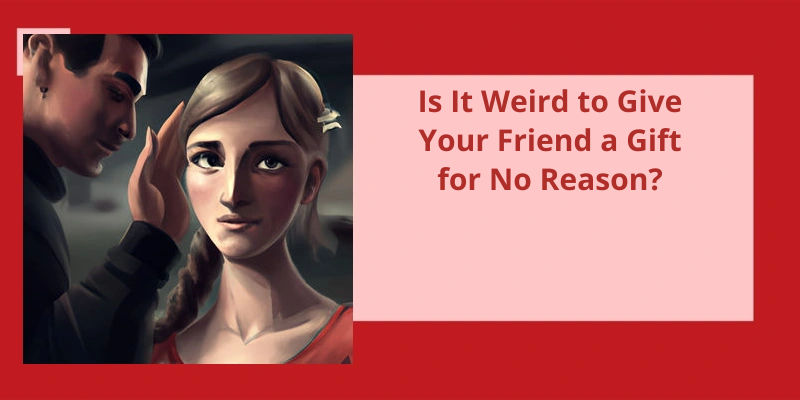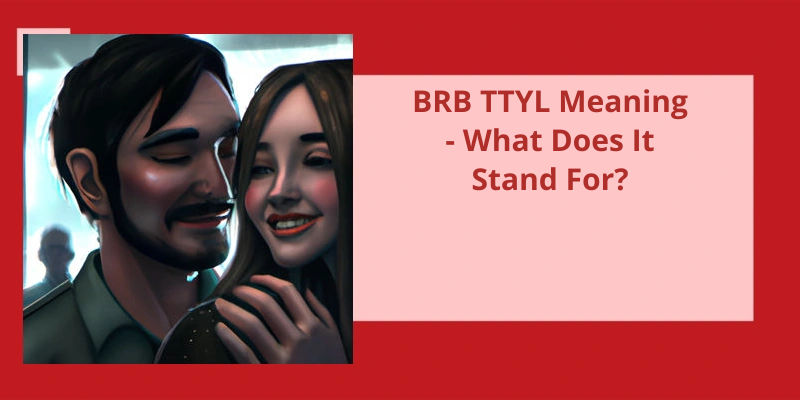In a world where materialism is often frowned upon, there’s still great value in the act of gift-giving. And when it comes to giving a present to a friend for no specific occasion, some people might debate whether it’s strange or not. However, the truth is that there’s nothing weird about it at all. In fact, giving your friend an unexpected gift can be a wonderful way to show your appreciation for their friendship and let them know how much they mean to you. It’s a simple gesture that can spread joy and positivity, and it shows that you care enough to go out of your way to do something special for them.
Can You Give Someone a Gift for No Reason?
It might seem unusual to give someone a gift without a special occasion or a reason, but it can actually have a very positive impact on your relationship with that person. Random acts of kindness are important to maintain the emotional connection with people. Giving someone a gift just because you want to show them that you care can go a long way in strengthening your bond with them.
Moreover, a spontaneous gift can be a great way to counteract negative feelings, like stress, anxiety, and depression. It’s a way to bring happiness and warmth to someones life and make them feel appreciated and acknowledged. A surprise gift can even be the perfect way to cheer someone up after a difficult day or week. There’s no doubt that a small gesture like this can lift peoples spirits and remind them that they aren’t alone.
There’s a concept in psychology called the “helpers high,” which posits that people who help others experience a sense of euphoria or well-being. Giving someone a gift for no reason can activate this same feeling and can even help you generate more positivity in your own life.
Therefore, giving a gift without particular reason is a fantastic way to show your generosity, and it can result in a beautiful and rewarding experience. It creates a virtuous cycle in which giving gifts leads to the recipient feeling happy, which in turn brings happiness to the giver. Ultimately, there’s no sweeter and more fulfilling feeling than making someone else smile without a specific cause.
The act of giving and receiving gifts is a complex social exchange that taps into many psychological factors. As we saw earlier, accepting gifts can be difficult for some individuals, and this is often linked to deep-seated fears of intimacy or feelings of unworthiness. But why do these reactions happen, and what can they tell us about human psychology? In this section, we will explore the psychology behind gift-giving and receiving, including what motivates people to give gifts, and why accepting gifts can be so challenging for some.
What Is the Psychology Behind Not Accepting Gifts?
Gift giving is a time-honored tradition across cultures and religions. While receiving gifts can make most of us feel happy and special, there are some who find it hard to accept them. The psychology behind this behavior goes much deeper than just simple manners. For some, the reason behind not accepting gifts lies in their past experiences, their sense of self-worth, or even societal pressure that forces them to appear humble.
Research show that people with avoidant attachment styles are more prone to rejecting gifts. These individuals are more likely to push people away due to a deep-seated fear of intimacy. Gift-givers are often seen as being too close and too personal, which can make such individuals feel anxious and uncomfortable. They can also subconsciously resent the notion of anyone knowing them well enough to give them something they want.
Societal pressure is also a significant factor in this behavior. In these cases, turning down a gift can be seen as a sign of being modest or maintaining cultural norms. While this may seem like simple politeness, it can also lead to missed opportunities to connect with others and share meaningful moments.
The Cultural Significance of Gift-Giving: How Different Cultures View Gift-Giving and the Role It Plays in Establishing Relationships and Expressing Emotions.
Exploring the cultural importance of gift-giving and it’s impact on building relationships and conveying emotions in different societies.
Source: Why is it seemingly so difficult for some people to accept …
Giving a gift can be a tricky situation, especially if you’re not sure what to get or how to give it. However, with these simple tips, you can give a gift without feeling awkward or uncomfortable. It’s important to choose a good gift, avoid giving money, and not give anything that could be misinterpreted. Additionally, knowing what to say (and what not to say) can make all the difference when giving a gift.
How Do You Give a Gift Without Being Awkward?
Gift-giving is a wonderful way to show someone that you care about them and appreciate their presence in your life. However, the act of giving gifts can sometimes be uncomfortable, particularly in situations where you don’t know the recipient very well. Whether it’s a co-workers birthday or a friends going-away party, there are certain rules to follow to make sure that your gift is both well-received and appropriate.
Choose a good gift. The key to giving a good gift is to make it personal. Take the time to think about what your recipient might enjoy, what their hobbies are, or what theyve mentioned they’d like. A thoughtful gift shows that youve put effort and care into the process. If youre unsure what they might like, a safe bet is always something consumable, like a nice bottle of wine or a box of chocolates.
In general, avoid giving money. While it might seem like an easy solution, giving cash or a gift card can come across as impersonal or lazy. It’s much better to put in the time and effort to find a gift that will truly resonate with your recipient. Plus, a physical gift is a tangible reminder of your connection to the person, while money can easily be forgotten.
Avoid crappy gifts. Weve all been there – receiving a gift that’s clearly a last-minute afterthought or something that the giver had lying around. But giving a crappy gift can be even worse, as it can make the recipient feel undervalued or unappreciated. It’s always better to give nothing at all than to give something thats clearly not worth the effort.
Avoid gifts that could be misinterpreted. This is particularly important in professional contexts or with people you don’t know very well. For example, giving a romantic gift to a colleague could be seen as inappropriate or make them uncomfortable. Be cautious with gifts that could be seen as too personal or intimate.
Give gifts at the proper occasions. Timing is everything when it comes to gift-giving. Dont show up to a wedding empty-handed, but don’t bring a gift to a casual dinner party either. Make sure you understand the occasion and dress code beforehand, and plan accordingly.
What to say when giving a gift. When presenting a gift, it’s always nice to add a personal touch. A simple “I hope you enjoy this!” or “I thought you might like this” is usually sufficient. If youre really close to the recipient, a heartfelt message about why you appreciate them or what the gift means to you can be a nice touch.
Avoid anything that could come across as insensitive or hurtful. This includes comments about the price of the gift (“I got this on sale, haha!”) or any judgmental comments about the recipient or the gift itself. It’s also best to avoid any jokes that could be seen as inappropriate or offensive.
Ultimately, the key to giving a good gift without being awkward is to put yourself in the recipients shoes. Think about what they’d genuinely appreciate and enjoy, and tailor your gift accordingly. With a little effort and thoughtfulness, your gift is sure to be a hit.
Receiving a gift can be a wonderful experience, but sometimes you may find yourself in a tricky situation where the gift isn’t quite your taste. In these situations, it’s important to respond gracefully while still being honest about your feelings. Here are 6 ways to respond to a gift you don’t like.
What to Say When Someone Gives You a Gift That You Don T Want?
You really shouldnt have.”. These are a few common responses that people often use to show gratitude when they receive a gift. But what if you receive a gift that you don’t want or need? How do you respond without hurting the givers feelings? Here are six ways to handle the situation gracefully.
Firstly, it’s important to acknowledge the thought and effort that the giver put into selecting the gift. Even if you don’t like the gift, you can say something like “Thank you so much for thinking of me. I really appreciate it.”. This shows that you’re grateful for their gesture.
Secondly, you can focus on a specific aspect of the gift that you do like. For example, if you receive a sweater that isn’t your style, you can say “The color is lovely, Im sure it will look great on someone else.”. This highlights a positive aspect of the gift while also indicating that it’s not something you plan to keep.
Thirdly, honesty can be the best policy. If you’ve a close relationship with the giver, you can say something like “I appreciate your gift, but it’s not something I can use. Would you mind if I exchanged it for something else?”. This approach is direct, but also shows that you value the relationship enough to be honest with them.
Fourthly, you can express gratitude while also explaining why the gift isnt suitable for you. For example, if you receive a cookbook but don’t enjoy cooking, you can say “I really appreciate your gift, but Im not much of a cook. Perhaps someone else would enjoy it more.”. This approach acknowledges the givers intentions while also explaining why the gift isnt right for you.
Fifthly, you can try redirecting the gift to someone who’d appreciate it more. For example, if you receive a piece of jewelry that isnt your style, you can say “This is a beautiful piece, but it’s not really my taste. I know someone who’d love it though.”. This approach shows that you value the gift, but also recognize that it would be better suited for someone else.
Lastly, if all else fails, simply thank the giver and move on. Sometimes it’s better to avoid hurting someones feelings and accept the gift with grace. You can say something like “Thank you so much for your kindness. I really appreciate your thoughtfulness.”. Remember, the act of giving is often more important than the gift itself.
How to Politely Decline a Gift Without Hurting the Giver’s Feelings.
When declining a gift, it’s important to express gratitude and appreciation for the gesture. Be honest and give a reason for declining. Offer an alternative way to show appreciation, like a handwritten note or a lunch out, to soften the blow. Remember to keep the focus on the relationship and not the material possession.
While gift-giving is often seen as a positive aspect of healthy relationships, it can also be used as a means of manipulation. This is because reciprocity is a crucial component of equality in relationships, and a power imbalance can arise when one person consistently gives without receiving in return. Unfortunately, abusive individuals may also use gifts as a tool for control.
Is Gift-Giving Manipulative?
Gift-giving is a complex subject that’s often sparked debates and discussions over it’s true nature and purpose. While some people view it as a way of expressing love, appreciation, and gratitude, others see it as an act of manipulation and deceit. The question of whether gift-giving is manipulative or not has been a controversial one for a long time. On the one hand, it could be argued that giving gifts is a way of showing affection and appreciation towards someone, whereas on the other hand, it could be seen as a way of exerting control over them.
In healthy relationships, gift-giving is often seen as a way of reciprocating affection and appreciation. It’s a way of showing your partner that you’re invested in the relationship and that you value them. However, when one person in the relationship constantly gives and the other constantly receives, this could lead to an unhealthy power dynamic. The constant giving could be seen as an attempt to manipulate the other person into feeling indebted and therefore more likely to comply with your wishes.
Another manifestation of gift-giving as a tool for manipulation is when it’s used by abusers. The abuser may use gifts to create a false sense of security or to buy the victims silence. In some cases, the abuser may even use gift-giving to create a sense of obligation in the victim and make them feel trapped in the relationship.
It’s important to be mindful of the balance of reciprocity in a relationship and to be aware of any power imbalances that might exist.
The Psychology Behind Gift-Giving and Why People Give Gifts
Gift-giving is a complex behavior that’s driven by various psychological factors. To give a gift is to express a range of emotions, such as love, gratitude, appreciation, and respect. People also give gifts to celebrate special occasions, to strengthen relationships, and to honor traditions. The act of gift-giving can provide a sense of satisfaction and fulfillment, as it allows one to contribute positively to the happiness of others. Ultimately, gift-giving is a way in which people connect with each other and express their feelings.
Giving a gift for no reason is a thoughtful and kind gesture that can brighten someone’s day. However, knowing what to say when gifting can be just as important as the gift itself. In this article, we’ll explore some meaningful phrases to use when giving someone a present for no particular reason.
What Do You Say When Giving a Gift for No Reason?
“I wanted to show my appreciation for all that you do.”. “I just wanted to brighten up your day with something special.”. “This gift doesn’t need a reason, it’s just a little something to show you how much I care.”
When giving a gift for no reason, it’s important to make the other person feel special and loved. You want them to know that you went out of your way to pick something out just for them. It’s the thought and effort that counts, not the cost of the gift.
If youre unsure what to say, try to think about why you chose this particular gift for the person. Did it remind you of a shared memory or interest? Does it show how much you value their friendship or relationship? Use these reasons to guide what you say when giving the gift.
Remember that giving a gift for no reason can be a surprise and may catch the other person off guard. Try to make the moment special and let them know how happy you’re to have them in your life. You could also add in a hug or a heartfelt note to make the gift even more meaningful.
Whether it’s a small trinket or a larger present, the sentiment behind it’s what truly matters. So, choose something that speaks to your relationship and let the words flow naturally from your heart.
Conclusion
It shows that you value their presence in your life and cherish their friendship. It's the little gestures that count and a small gift can go a long way in making someone's day. So next time you feel like showing your friend how much they mean to you, don't think twice before giving them a gift just because you can!






